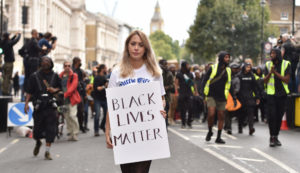Monk Ellison, a struggling black college professor, writes My Pafology as a prank: the stereotype-laden novel is a clapback at the publishers who equate “Black stories” with tropes of poverty, brutality, and violence.
But the joke, as it turns out, is on Monk: a major publisher wants to buy the novel for almost a million dollars. When he takes the call, he nearly blows the entire deal.
“This is he,” he says, crisply — and the publisher, a white woman named Paula, flinches at the sound of his voice.
“Really?” she says, incredulous.
Monk reluctantly, hilariously, gets into character. “Yeah,” he growls, putting on an exaggerated blaccent, and then adds: “God damn it! Motherfucker!”
Monk Ellison is the protagonist of American Fiction (one of the nominees for Best Picture at this year’s Oscars); when I saw the movie, this was the moment when the people around me started to laugh — not just because of the swearing, but because of Paula’s reaction to it. Her whole body relaxes as she laughs and nods: “I was a little confused at first,” she says. Now, she’s relieved: expectation and reality are back in perfect alignment, and all is right with the world.
The audience, meanwhile, is experiencing a different kind of relief: finally, someone has admitted that the emperor has no clothes.
If 2020 was the peak of culture’s great awokening, 2024 may be remembered as the year the dam finally broke. Within the past year, satirising the identitarian obsessions of the publishing world has almost become a genre of its own. It’s not just American Fiction — adapted by Cord Jefferson from the 2001 novel Erasure amid Hollywood’s sudden circa-2020 surge of enthusiasm for stories by and about people of colour. There was also R.F. Kuang’s Yellowface, in which a white writer passes off the manuscript of her deceased Chinese-American friend as her own. And this week brings us Andrew Boryga’s Victim, a novel that pokes similar fun at the pieties of an industry that runs on equal parts white guilt and black trauma.
Victim tells the story of Javi, a young, bookish man from the Bronx who slowly awakens — with the encouragement of various well-meaning white authority figures — to the power of being powerless. Much like American Fiction‘s Monk, Javi’s greatest asset is his ability to tell privileged liberals the feel-bad stories they yearn to hear. The events of his childhood, from the death of his drug dealer father at the hands of a disgruntled associate to his best friend’s arrest, secure his admittance to a prestigious college — a ripped-from-the-headlines plot development based on the real phenomenon of a college admissions process that heavily incentivises applicants to produce narratives of minoritised suffering.
On campus, Javi hones his skills. “I peeped game and realized I happened to be uniquely equipped to thrive in it,” he says. He embellishes, obfuscates, appropriates, and reaps the rewards — even as part of him marvels at the absolute grift of it all. But he didn’t create the game, or write the rules; he’s just playing to win.
If stories like this centre on the marginalised people who manage to medal in the oppression Olympics, they are also implicitly about the game makers: people like Paula, whose self-proclaimed interest in black voices applies only if those voices are singing the right songs, parroting the prescribed lines, playing the assigned role. Both Victim and American Fiction zero in on this dynamic, exploring the precise moment when a white person’s unspeakable thought becomes sayable — if expressed by someone of another identity. “I know you want me to write about being poor and stuff,” Javi tells his high school guidance counsellor, who hastily and nervously corrects him: “I didn’t say that.” When Monk trolls his publisher by insisting on changing the book’s title from My Pafology to FUCK, an obsequious marketing executive enthuses that the new title is very, um…
“Black?” Monk says, dryly.
“That’s it, yes, that’s it!” the other man giggles. “I’m happy you said it, and not me!”
But unlike Monk, who watches in horror as his practical joke takes on a highly remunerative life of its own, Javi is more than happy to master the art of wielding power through the pretence that he has none. “I felt like a dominatrix,” he observes, after he skewers a white editor — who has just offered him a coveted staff writer job on the diversity beat at a Brooklyn magazine — as a gentrifier. It’s a moment that reveals the astonishing cynicism of the entire enterprise: the suffering, the degradation, the stories, are all part of a sadomasochistic farce in which everyone, including the self-consciously woke white editor with all his grovelling assurances that he intends to do the work, is just playing a role. Like the purveyor of trauma porn, the dominatrix takes your money and puts on a show of making you lick her boots — but as long as she stays in character, what do you care who she is when the costume comes off?
In the past 10 years, as American centres of culture have become increasingly politicised, publishing has become increasingly convinced of its own importance as a driver of political and social progress. In the meantime, some critics (including myself) have observed that the initiatives meant to elevate writers from marginalised backgrounds have a funny way, in practice, of pigeonholing them. Instead of simply opening their doors to good stories told by a diverse variety of authors, publishers built a rarefied ghetto and got busy filling it with token writers telling token tales of trauma, oppression, injustice.
The result is not just a homogenised literary landscape, but a reading public that increasingly cannot grok that “diverse” writers do not, in fact, all look or act or think alike. This has long been a point of frustration for black writers whose interests lie outside the narrow realm of “Black stories” (an early scene in American Fiction finds Monk ranting over the discovery that his books are shelved in the “African-American fiction” section of a store, shouting: “The blackest thing about this one is the ink!”) But it has also ironically fuelled the phenomenon of racial hoaxsters in places like academia, where minority scholars who eschew minstrelsy find themselves passed over in favour of pretenders who play to stereotype. In a world obsessed with identity as aesthetic, a white woman in feathers and beads inevitably reads as more “authentic” than a Native professor in a three-piece suit.
The success of writers such as Jefferson and Boryga lies in the way they step outside the paradigm that demands stories of black suffering, choosing instead to turn a mirror on the guilty white liberals who yearn to be One of the Good Ones. The whole thing puts me in mind of the court jester, privileged with permission to mock the nobles — but only by the grace of the nobles themselves. Publishing has painted itself into this corner, has made itself ridiculous, but nobody in charge can admit this; instead, they carefully appoint writers of the proper identity to point out the absurdity. I’m happy you said it and not me.
For this reason, much of the praise for these works makes me somewhat uneasy. It’s in the tone and terms alike, at once fawning and familiar: American Fiction, for instance, is “scathing“, “a searing indictment of biased norms“, and “perhaps the most vital film currently in theaters“. Victim is similarly congratulated for pulling no punches; a glowing blurb on the book’s cover describes it as “brave”. That these works deserve accolades is not in question — they’re both brilliant, irreverent, and funny as hell — but it’s hard not to notice that the critical apparatus talks about them using the same language it once bestowed on the same personalities, the same grift, which these satirists so gleefully and effectively eviscerate. How is it that even now, the highest compliment we can think to pay a minority writer is not to praise the beauty of his language, or the quality of his storytelling, but rather to congratulate him on making the right people — which is to say, white people — uncomfortable?
That a book like Victim even exists is no doubt a step in the right direction — and a welcome relief, too, after however many years in which anyone who dared to question the effectiveness of the DEI-industrial complex would be instantly smeared as a racist. It would be nice, though, to someday move past the mockery, into a world where gifted writers could simply write good books without identity ever entering into it. Lampooning the pieties of publishing’s self-styled white saviours is a good start; seeing them discarded entirely would be even better.
Perhaps we will. Given the length of time it takes for a manuscript or screenplay to become a cultural product, the most optimistic take on works like American Fiction and Victim is that they represent the seeds of a saner, slow-growing consciousness that is finally bearing fruit. Indeed, the extreme salience of these stories to our present moment is only possible because their creators had the audacity and prescience to anticipate this moment, and to speak to it, back when it was still professionally risky to do so.
And of course, our satirists are often harbingers of imminent cultural change: permission to laugh at the thing is, in many cases, the first step to dismantling it. Self Care, a satire of the wellness industry and the powerful women within, was released in 2020, just as girlbosses began toppling en masse from their millennial pink pedestals. The movie Saved! offered a send-up of American evangelical Christianity at precisely the same moment when it lost its cultural power. American Psycho, released in 1991, was a blood-spattered, cackling adieu to the archetypal Eighties yuppie.
And yet, for the moment, the future remains unclear. Not long after finishing the last page of Victim, I stumbled across a deal announcement for another book called THE OVERSEER CLASS: REPRESENTATION AS REPRESSION. Written by a black academic, the book argues that there exists a cabal of power-hungry Uncle Toms — people of gay, black, or otherwise minority backgrounds “who amass power by cracking the skulls of their own”. The announcement describes a “good” deal, which is publishing code for a six-figure advance. In other words: even as some people, like Boryga, are subverting the thing, others are clearly continuing to do the thing, or to pay other people good money to do it. And if woke literature is on its way out, at this moment, rumours of its death are still greatly exaggerated. “Representation as repression?” If Boryga’s fictional protagonist had been a real boy, he could not have done better.
view 28 comments





















